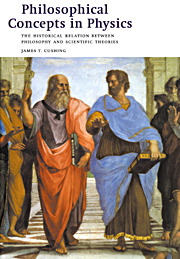 Philosophical Concepts in Physics
Philosophical Concepts in Physics Published online by Cambridge University Press: 05 June 2012
In this chapter we consider several of the empirical implications that follow from Einstein's two postulates and relate these to experimental tests of special relativity. The emphasis is on how many diverse, quantitative predictions result from two verbal statements that appear so disarmingly simple and qualitative in nature. Just as Newton's system of classical mechanics and theory of gravity gained universal acceptance because of its many quantitative successes and its wide range of applicability to seemingly unrelated phenomena (recall Chapter 11), so Einstein's special theory of relativity soon became the dominant theory because of the great scope of its achievements.
RELATIVISTIC DOPPLER EFFECT
We begin by considering the effect that relative motion has on the measured frequency of light. In a classical, or nonrelativistic, context this was originally discussed by Christian Doppler (1803–1853) in 1842. The relativistic version was first treated by Einstein in his 1905 ‘relativity’ paper. In Figure 17.1 let observer B be moving parallel to and in the same direction as the propagation of the wave front, all as seen by observer A. From the point of view of A, for whom the wavelength (or distance between successive wave fronts) is λ, the time t that it takes for two successive wave fronts to pass the moving observer B is t = (λ + vt)/c. Denote by t′ (a proper time) the time B measures between the passage of these two wave fronts (past B).
To save this book to your Kindle, first ensure [email protected] is added to your Approved Personal Document E-mail List under your Personal Document Settings on the Manage Your Content and Devices page of your Amazon account. Then enter the ‘name’ part of your Kindle email address below. Find out more about saving to your Kindle.
Note you can select to save to either the @free.kindle.com or @kindle.com variations. ‘@free.kindle.com’ emails are free but can only be saved to your device when it is connected to wi-fi. ‘@kindle.com’ emails can be delivered even when you are not connected to wi-fi, but note that service fees apply.
Find out more about the Kindle Personal Document Service.
To save content items to your account, please confirm that you agree to abide by our usage policies. If this is the first time you use this feature, you will be asked to authorise Cambridge Core to connect with your account. Find out more about saving content to Dropbox.
To save content items to your account, please confirm that you agree to abide by our usage policies. If this is the first time you use this feature, you will be asked to authorise Cambridge Core to connect with your account. Find out more about saving content to Google Drive.